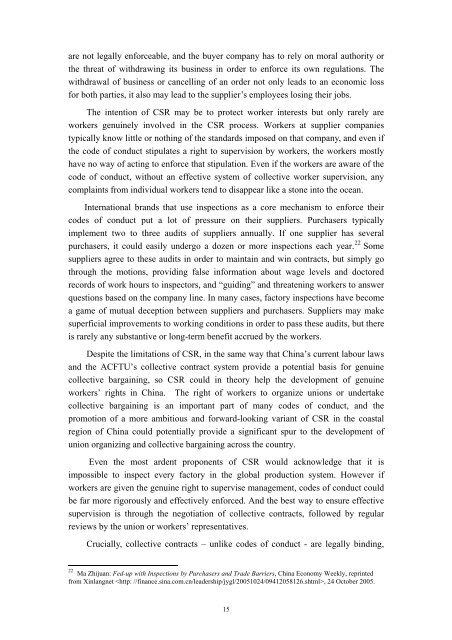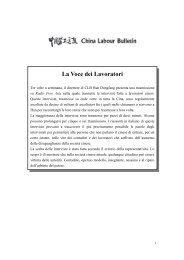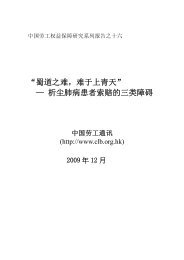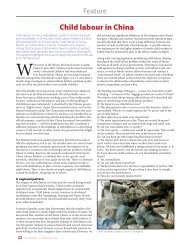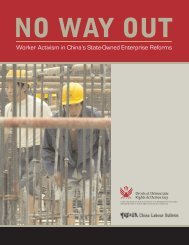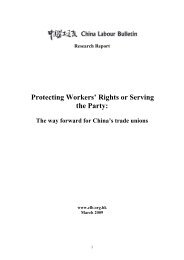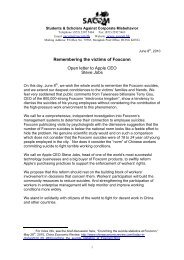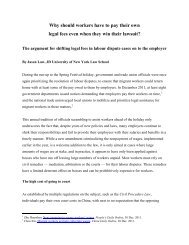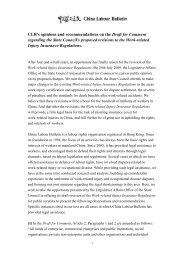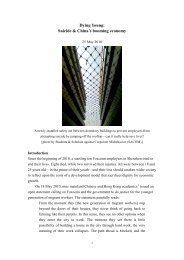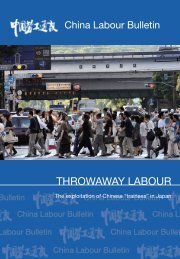here - China Labour Bulletin
here - China Labour Bulletin
here - China Labour Bulletin
You also want an ePaper? Increase the reach of your titles
YUMPU automatically turns print PDFs into web optimized ePapers that Google loves.
are not legally enforceable, and the buyer company has to rely on moral authority or<br />
the threat of withdrawing its business in order to enforce its own regulations. The<br />
withdrawal of business or cancelling of an order not only leads to an economic loss<br />
for both parties, it also may lead to the supplier’s employees losing their jobs.<br />
The intention of CSR may be to protect worker interests but only rarely are<br />
workers genuinely involved in the CSR process. Workers at supplier companies<br />
typically know little or nothing of the standards imposed on that company, and even if<br />
the code of conduct stipulates a right to supervision by workers, the workers mostly<br />
have no way of acting to enforce that stipulation. Even if the workers are aware of the<br />
code of conduct, without an effective system of collective worker supervision, any<br />
complaints from individual workers tend to disappear like a stone into the ocean.<br />
International brands that use inspections as a core mechanism to enforce their<br />
codes of conduct put a lot of pressure on their suppliers. Purchasers typically<br />
implement two to three audits of suppliers annually. If one supplier has several<br />
purchasers, it could easily undergo a dozen or more inspections each year. 22 Some<br />
suppliers agree to these audits in order to maintain and win contracts, but simply go<br />
through the motions, providing false information about wage levels and doctored<br />
records of work hours to inspectors, and “guiding” and threatening workers to answer<br />
questions based on the company line. In many cases, factory inspections have become<br />
a game of mutual deception between suppliers and purchasers. Suppliers may make<br />
superficial improvements to working conditions in order to pass these audits, but t<strong>here</strong><br />
is rarely any substantive or long-term benefit accrued by the workers.<br />
Despite the limitations of CSR, in the same way that <strong>China</strong>’s current labour laws<br />
and the ACFTU’s collective contract system provide a potential basis for genuine<br />
collective bargaining, so CSR could in theory help the development of genuine<br />
workers’ rights in <strong>China</strong>. The right of workers to organize unions or undertake<br />
collective bargaining is an important part of many codes of conduct, and the<br />
promotion of a more ambitious and forward-looking variant of CSR in the coastal<br />
region of <strong>China</strong> could potentially provide a significant spur to the development of<br />
union organizing and collective bargaining across the country.<br />
Even the most ardent proponents of CSR would acknowledge that it is<br />
impossible to inspect every factory in the global production system. However if<br />
workers are given the genuine right to supervise management, codes of conduct could<br />
be far more rigorously and effectively enforced. And the best way to ensure effective<br />
supervision is through the negotiation of collective contracts, followed by regular<br />
reviews by the union or workers’ representatives.<br />
Crucially, collective contracts – unlike codes of conduct - are legally binding,<br />
22 Ma Zhijuan: Fed-up with Inspections by Purchasers and Trade Barriers, <strong>China</strong> Economy Weekly, reprinted<br />
from Xinlangnet , 24 October 2005.<br />
15


